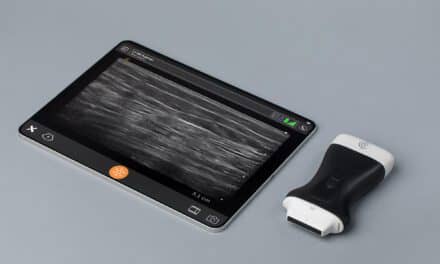The Jewish Hospital Hand Care Center (Louisville, Kentucky) is known for its success with hand transplants. But when the team’s fourth patient, Dave Armstrong, had to get his hand amputated in April 2009, the team put on the brakes until they found technology to help them keep transplanted hands attached.
They’d already transplanted a fifth patient, but waited until August 2010 to perform the sixth procedure. The team’s first double hand transplant was on patient Rich Edwards of Oklahoma. Edwards and now all the hand transplant patients at Jewish are receiving routine tests with the center’s new ultrasound biomicroscopy device.
"When you look at the resolution, it’s 1000 times at least better" says Christina Kaufman, a veteran research member of the hand transplant team with the Christine M Kleinert Institute. Purchased with funds from the Department of Defense, Kaufman says it cost "a quarter of a million dollars."
The team is hopeful this research device will prove be the key in detecting potential rejection.
On the surface, the rejection episode in Armstrong happened quickly, "we saw him in March and everything was fine," Kaufman says, "he looked great and then a month later is was disaster."
Armstrong was just 9 months post transplant when surgeons with the University of Louisville and Kleinert, Kutz and Associates amputated the rejected hand. Looking back, Kaufman says the team realizes, "that we were doing this, we were blind, we were absolutely blind."
Prior to the ultrasound, it required biopsies to get the type of measurements they’re tracking. They see muscle, nerves, tendons, and can even measure blood flow. What they’re most interested in, however, is a white line found around the artery. It’s smooth muscle gives the artery its stiffness, and in Armstrong that is what thickened and prevented blood flow.
"Now that didn’t happen overnight," Kaufman says. "We do believe it was rejection process, whether it was only rejection we’re not really sure about that." What she does feel certain about, "if we caught that early enough we may have been able to intervene."
More.
[Source: WAVE 13 (TV), Louisville, Ken]


